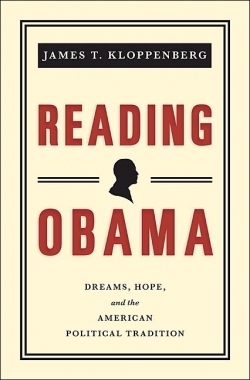Reading Obama
Dreams, Hope, and the American Political Tradition
Much has been and will be written on Barack Obama the politician, but until now, little has appeared on Obama the intellectual. This lucid investigation of the president’s intellectual roots is an important addition to Obama literature because it reveals more of who he is than what he has done in the political arena.
Foremost, author James Kloppenberg identifies Obama as a pragmatist, a follower of American philosophers William James and John Dewey. More than once, Kloppenberg makes the important point that philosophical pragmatism is not expediency. Most of the book is an illuminating analysis of what formed the president’s pragmatism, which is characterized by continual debate, input from supporters and adversaries, and compromise. This process is much different from the shrill attacks made by both parties on each other and on Obama himself. Kloppenberg skillfully parses Obama’s two bestselling books, Dreams from My Father (1994) and The Audacity of Hope (2006), calling them the most significant books written by anyone elected president since Woodrow Wilson, perhaps because he sees Obama as having a greater appreciation of the past than any president since Wilson and Theodore Roosevelt.
Obama’s books indicate that all of his life experiences have shaped his pragmatism: his youth in multicultural Hawaii; his student years at Occidental College, Columbia University, and Harvard Law School; his years as a community organizer; and his tenure in the rough world of Chicago politics. His intellectual influences include James Madison, Abraham Lincoln, W.E.B. Du Bois, Ralph Ellison, and several neo-pragmatists who are discussed accessibly. Gordon Wood’s The Creation of the American Republic, 1976-1787, which emphasized civic republicanism, was also important in shaping Obama’s thought. Civic republicanism as promoted by Adams, Jefferson, and Madison emphasized cooperation as the means to forge a democracy that would promote the common good.
James Kloppenberg is the Charles Warren Professor of American History at Harvard, where he also heads the history department. His previous books include Uncertain Victory: Social Democracy and Progressivism in European and American Thought, 1870-1920, The Virtues of Liberalism, and A Companion to American Thought. His interest in political thought makes him an able interpreter of Obama’s work and influences.
The fascinating account he shares in Reading Obama reveals the often-inscrutable president by showing how his life and learning have molded his worldview. All readers will find much to consider in this absorbing book.
Reviewed by
Karl Helicher
Disclosure: This article is not an endorsement, but a review. The publisher of this book provided free copies of the book to have their book reviewed by a professional reviewer. No fee was paid by the publisher for this review. Foreword Reviews only recommends books that we love. Foreword Magazine, Inc. is disclosing this in accordance with the Federal Trade Commission’s 16 CFR, Part 255.

